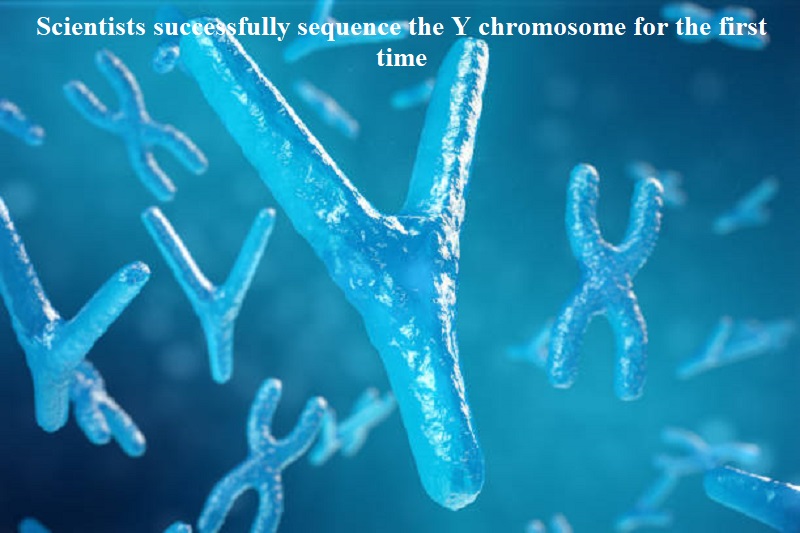
In a momentous feat poised to reshape our understanding of human biology, scientists have achieved a landmark by successfully decoding the Y chromosome for the very first time. This milestone bears the potential to unearth crucial insights into human genetic material, which could potentially revolutionize the exploration of male infertility and a spectrum of health disorders.
Initiating efforts to unravel the core components of our genetic blueprint commenced two decades ago. However, substantial gaps persisted across the 23 pairs of human chromosomes. Remarkably, these gaps were largely bridged last year, thanks to the concerted endeavors of a global coalition of 100 researchers known as the Telomere-to-Telomere (T2T) Consortium.
This achievement proves especially significant as the Y chromosome stands as the most intricate among all chromosomes.
Despite the seemingly successful outcomes of the Human Genome Project and the T2T consortium, more than half of the sequences residing within the Y chromosome remained a puzzle. Yet, a team of scientists has now filled these gaps, culminating in the unveiling of a comprehensive Y chromosome sequence.
The outcomes of this breakthrough were chronicled in the prestigious journal Nature.
Monika Cechova, co-lead author of the study, conveyed in an official statement, “Just a few years ago, half of the human Y chromosome was missing (from the reference).” She further expounded, “This is really a huge shift in what’s possible.”
In the normal course, each human cell harbors a pair of sex chromosomes, with males inheriting both an X and a Y chromosome, while females bear two X chromosomes.
The newfound precision within the updated Y reference sequence is poised to facilitate the exploration of conditions and disorders tied to this chromosome, notably including male infertility attributed to insufficient sperm production.
Recent research has also highlighted the broader significance of the Y chromosome in matters concerning health and longevity.
Professor Kenneth Walsh from the University of Virginia School of Medicine informed CNN that specific genes residing on the Y chromosome play a pivotal role in thwarting cancer and cardiovascular diseases.
Dubbed the “dark matter” of the genome, the Y chromosome has long remained shrouded in mystery.
However, this new analysis provides insights into its regulatory functions, as well as the potential encoding of mRNA and proteins.
Walsh conveyed via email to CNN, “Genes have been identified on the Y chromosome that has been shown to be required for the prevention of cancer and cardiovascular disease.”
He further emphasized, “The Y chromosome has represented the ‘dark matter’ of the genome. This new analysis will allow us to better understand the regions of the Y chromosome that have regulatory functions and may encode mRNA and proteins.”
As individuals age, particularly in cells characterized by swift regeneration such as blood cells, the Y chromosome begins to dwindle. The causes and health implications underlying this phenomenon have remained unclear, though recent research suggests links to severe bladder cancer and heightened risk of heart disease.
A comprehensive genetic reference for the Y chromosome may cast light on these connections.
According to Walsh, this research merely scratches the surface of comprehending the Y chromosome’s role in age-associated diseases, potentially contributing to understanding why men tend to have shorter lifespans compared to women.
Comprising over 30 million repetitive letters within its total of 62.5 million, often labeled as satellite or junk DNA, the Y chromosome also encompasses palindromes—sequences of letters that read identically forwards and backwards.
Unraveling this enigma presented a challenge due to its repetitive nature.
This repetition complicated the process of assembling data from genetic sequencing, akin to reading a book that’s been cut into strips, where repetition obscures the original order.
However, advanced “long-read” sequencing technology and computational methodologies empowered researchers to achieve a comprehensive reading of the Y chromosome.
This achievement added over 30 million repetitive base pairs to the human reference genome.
In the same vein, researchers compiled a “pangenome” this year, incorporating DNA from individuals spanning the globe, enhancing inclusivity within the human genome. Alongside this, a collaborative team reconstructed Y chromosomes from diverse populations, capturing genetic diversity.
Charles Lee, a senior author of the collaborative research paper, underscored the pivotal role of proper gene function within the Y chromosome for overall men’s health. He emphasized that their study equips forthcoming sequencing initiatives to delve into health and disease aspects by incorporating a comprehensive Y chromosome perspective.
Y chromosome infertility is a prevalent genetic condition that impacts male fertility. It occurs in roughly 1 in 2,000 to 1 in 3,000 males across ethnic groups. This genetic condition contributes to about 13 percent of azoospermia cases (absence of motile sperm in semen) and 5 percent of severe oligospermia cases (low sperm count). A specific type of genetic mutation called Y-chromosome microdeletions is responsible for causing this condition.
The Y chromosome plays a pivotal role in male fertility, housing various genes such as SRY (Sex-determining Region Y) and SOX9 (SRY-Box Transcription Factor 9), responsible for testes development and sperm production. However, even a small section of the Y chromosome missing can lead to significant consequences, including diminished sperm production or a complete absence of sperm in the semen, resulting in infertility.
The complete sequencing of the Y chromosome enables precise identification and treatment of the exact causes of such infertility.

Post Your Comments